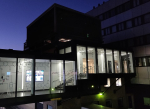
The iconic Arcadia stage at Glastonbury comes alive as a colossal metal spider breathes fire into the night sky, while the beats of the Chemical Brothers electrify the crowd. What sets this year
apart is that the entire Glastonbury festival, including Arcadia and all other stages, is powered by renewable energy sources, according to organizers.
The renowned music festival in England, known for its diverse lineup and vibrant art installations, has long been an advocate for sustainability. In the past, Glastonbury even hosted one of the largest private solar power plants in the UK.
This year, all the festival's generators, including those powering the main Pyramid stage, will run on hydrotreated vegetable oil, a renewable alternative to diesel produced from waste cooking oil, as confirmed by organizers.
Co-founder of the Arcadia stage, Bertie Cole, explained the rationale behind the shift, stating, "With the current infrastructure that festivals run on, it was clear one of the more efficient ways it could be done is by using a waste fuel to power all those bits of machinery." He further added, "It's been an ongoing experiment, and this year it just felt like we had got there," as shared with British monthly DJ Mag.
While Glastonbury takes pride in its social consciousness, it has faced criticism in the past for its environmental impact, including the issue of waste left behind by the festival's 200,000 attendees, despite organizers urging a "leave no trace" policy.
The festival has also grappled with challenges like public urination contaminating the local freshwater ecosystem near Worthy Farm, often caused by drug-taking festivalgoers. Additionally, the carbon footprint generated by people traveling to Glastonbury, many of whom fly in from overseas, has been a significant concern.
Nevertheless, organizers are making concerted efforts to mitigate the festival's overall impact. This year, a temporary 20-meter wind turbine, another source of renewable power, stands tall over a section of Worthy Farm, providing energy to food stalls equivalent to running 300 fridges per day.
As Glastonbury continues to blend music, art, and sustainability, the giant spider at the Arcadia stage serves as a symbolic reminder of their commitment to embracing renewable energy and reducing environmental harm. Photo by Czampal, Wikimedia commons.









































